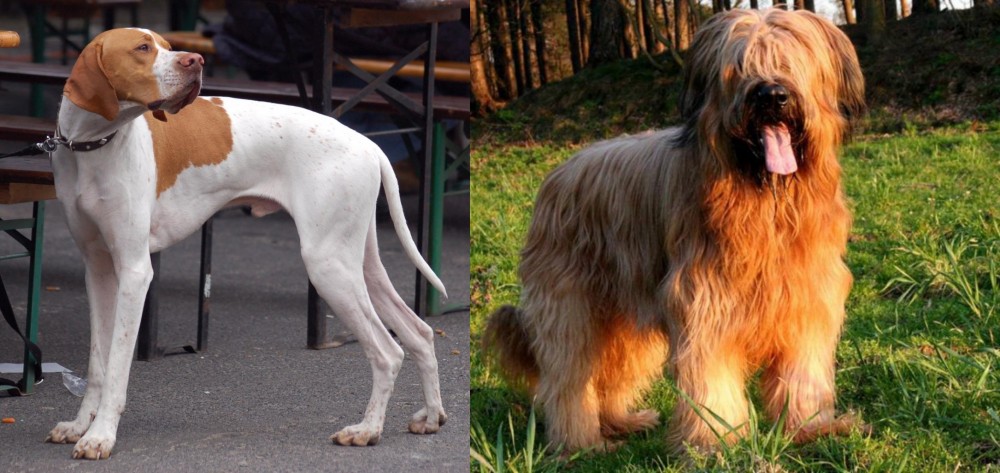 Petzlover
Petzlover English Pointer is originated from United Kingdom but Briard is originated from France. Both English Pointer and Briard are having almost same height. English Pointer may weigh 6 kg / 13 pounds lesser than Briard. Both English Pointer and Briard has almost same life span. Both English Pointer and Briard has same litter size. English Pointer requires Low Maintenance. But Briard requires High Maintenance
English Pointer is originated from United Kingdom but Briard is originated from France. Both English Pointer and Briard are having almost same height. English Pointer may weigh 6 kg / 13 pounds lesser than Briard. Both English Pointer and Briard has almost same life span. Both English Pointer and Briard has same litter size. English Pointer requires Low Maintenance. But Briard requires High Maintenance
 We can find records for pointers from 17th century. Breeds such as Old Spanish and Portuguese Pointer were set in to England from European Mainland. In 1800s they were brought to America and then they slowly developed their hunting skills and in 1910 they became an excellent bird hunter. In 1936 Modern American Kennel was established and they bred pointers in large quantities. They are very popular in southern United States and are called as "bird dog". Pointers are good in hunting birds like pheasant and grouse. They got their name because of their special skills in hunting.
We can find records for pointers from 17th century. Breeds such as Old Spanish and Portuguese Pointer were set in to England from European Mainland. In 1800s they were brought to America and then they slowly developed their hunting skills and in 1910 they became an excellent bird hunter. In 1936 Modern American Kennel was established and they bred pointers in large quantities. They are very popular in southern United States and are called as "bird dog". Pointers are good in hunting birds like pheasant and grouse. They got their name because of their special skills in hunting.
 Through myth and legend, the Briard is thought to be a very ancient dog. A French herding breed, a Briard type of dog appears in writings as early as the end of the 14th century. According to legends the Briard was owned by Napoleon, Charlemagne, Lafayette and Thomas Jefferson. As a cross between the Barbet and the Beauceron, the Briard came into popularity following its appearance in a Paris dog show in 1863. Bred originally to guard and herd sheep, these intelligent, independent dogs were often left on their own. Because they both guarded and herded, their size and structure as well as their personalities were different from other dogs that worked sheep. Those that herded only were fast, agile and smaller. Those that only guarded were heavier, bigger and stronger. The Briard was in-between these two types of breeds. He was well suited to any kind of farm work and guarded the crops from the sheep’s desire to eat them. They moved the sheep from one grazing area to another and then to their holding area at night. No humans had to assist the Briard in this work once they were trained.
Through myth and legend, the Briard is thought to be a very ancient dog. A French herding breed, a Briard type of dog appears in writings as early as the end of the 14th century. According to legends the Briard was owned by Napoleon, Charlemagne, Lafayette and Thomas Jefferson. As a cross between the Barbet and the Beauceron, the Briard came into popularity following its appearance in a Paris dog show in 1863. Bred originally to guard and herd sheep, these intelligent, independent dogs were often left on their own. Because they both guarded and herded, their size and structure as well as their personalities were different from other dogs that worked sheep. Those that herded only were fast, agile and smaller. Those that only guarded were heavier, bigger and stronger. The Briard was in-between these two types of breeds. He was well suited to any kind of farm work and guarded the crops from the sheep’s desire to eat them. They moved the sheep from one grazing area to another and then to their holding area at night. No humans had to assist the Briard in this work once they were trained.
During World War 1, the Briards were drafted into service as messengers, sentries and search dogs for lost or injured soldiers. In that time frame the breed served almost to the point of extinction. Breeding programs following the war brought them back. Today the Briard is a home companion, a police dog, as well as both military and civilian search and rescue dogs.
 Pointer has a long head and its body is perfectly suitable for hunting. In hunting the pointers shows hunter the direction of the bird and also they will go and get them after they were shot. They are well known for their speed, energy and continuous working. Pointers are also a good companion dog and love the family members so much. It is very easy to groom them as they have short coat. They are very alert and excellent watch dog.
Pointer has a long head and its body is perfectly suitable for hunting. In hunting the pointers shows hunter the direction of the bird and also they will go and get them after they were shot. They are well known for their speed, energy and continuous working. Pointers are also a good companion dog and love the family members so much. It is very easy to groom them as they have short coat. They are very alert and excellent watch dog.
If pointer is not set in huntng then they should be given lots of exercise daily. Pointers love to play and run with children. They will give a good company for cyclists. Pointers show their talents in dog shows especially in obedience and field trials. They will not worry about the crowd surrounding them and performs well. In performing at public, pointer will show perfect attention to its master. Pointer must be trained slowly from its puppyhood to get good results.
 The Briard is a powerful, intelligent and independent working dog. They have a straight topline and their height is almost the same as their length. They have long, large, rectangular heads with wide muzzles. Their noses are also square and jet black while their side set, large eyes can be black-brown or black. Their ears have traditionally been cropped but with more countries outlawing it, they can now have natural ears set high on the head. They have a tail that is feathered and low-cut. The feet of a Briard are round, compact and large.
The Briard is a powerful, intelligent and independent working dog. They have a straight topline and their height is almost the same as their length. They have long, large, rectangular heads with wide muzzles. Their noses are also square and jet black while their side set, large eyes can be black-brown or black. Their ears have traditionally been cropped but with more countries outlawing it, they can now have natural ears set high on the head. They have a tail that is feathered and low-cut. The feet of a Briard are round, compact and large.
The Briard is a double coated breed with a long beard and mustache. Their hair completely covers the head and the eyes so that they are not seen. They have prominent eyebrows as well.
 Pointer is a wonderful kid friendly dog and a nice companion. Also he is very energetic,fun-loving and an excellent watchdog. Pointers are very courageous as well as obedient. They can work for a very long time. Early socialization will make them with a good behaviour.
Pointer is a wonderful kid friendly dog and a nice companion. Also he is very energetic,fun-loving and an excellent watchdog. Pointers are very courageous as well as obedient. They can work for a very long time. Early socialization will make them with a good behaviour.
They will be happy if they are given a fenced yard to play and spend their natural energy. They will not have a good behaviour in apartment living. Pointers always likes to be with some one in his family. They are suitable for areas having hot weather and they will not do better in cold weather.
Pointers have very high intelligence and thus they are very easy to train. Good behaviours must be taught to them and the main word they must learn is "NO". They should stop what they are doing when they hear the word "NO" from you. "Sit" is another important word they should learn. Training should be given friendly and not compelling them to do it. Giving reward to them will make them happy and give more interest in training.
 As mentioned previously the Briard is intelligent and independent. They are also loyal, rugged, protective and bond intensely with their humans. They are often aloof when it comes to strangers or even when new furniture is introduced into the household. They have to learn that anything new into the family environment is friendly and good. They are great with children and susceptible to separation anxiety because of their deep affection for their people. Socialization for puppies is a must. This will let them know that people and children, other dogs in general are not harmful to their families. They have great memories and once they learn something – right or wrong – it is almost impossible to change it. They were bred to be independent thinkers who acted on their own conclusions. This is still true of the breed today, making them appear to be stubborn.
As mentioned previously the Briard is intelligent and independent. They are also loyal, rugged, protective and bond intensely with their humans. They are often aloof when it comes to strangers or even when new furniture is introduced into the household. They have to learn that anything new into the family environment is friendly and good. They are great with children and susceptible to separation anxiety because of their deep affection for their people. Socialization for puppies is a must. This will let them know that people and children, other dogs in general are not harmful to their families. They have great memories and once they learn something – right or wrong – it is almost impossible to change it. They were bred to be independent thinkers who acted on their own conclusions. This is still true of the breed today, making them appear to be stubborn.
They are great watchdogs, fearless and brave; willing to learn, eager to make you happy. They are basically gentle but that always runs up against their protective nature. A strong alpha leader is needed to handle this hard-working dog.
 Pointers face health problems such as gastric torsion, hypothyroidism and canine hip dysplasia. Overweight will also lead to many health problems in them. Other problems seen in them are cardiomyopathy, ectropion and progressive retinal atrophy.
Pointers face health problems such as gastric torsion, hypothyroidism and canine hip dysplasia. Overweight will also lead to many health problems in them. Other problems seen in them are cardiomyopathy, ectropion and progressive retinal atrophy.
They have the chances to get several skin disorders which leads to hairfall. Follicular Dysplasia is a hereditary disorder which causes hairfall. Special shampoos or lotion to combat the dry skin should be used to overcome this problem.
 Being a large breed, the Briard shares many of the same health concerns as other large breeds. They have a few of their own as well. Typical issues for a Briard might include:
Being a large breed, the Briard shares many of the same health concerns as other large breeds. They have a few of their own as well. Typical issues for a Briard might include:
Progressive Retinal Atrophy/Degeneration –degeneration of the photoreceptors and retina.
 Normally puppies require more food when compared with adult to meet their growth needs. The food given to the pointer puppy must contain vitamins, carbohydrates and minerals. Also the food given to his mother should be continued to the puppy as to avoid digestive problems for the puppy. If it is needed to change the food then it should be done in a step by step process.
Normally puppies require more food when compared with adult to meet their growth needs. The food given to the pointer puppy must contain vitamins, carbohydrates and minerals. Also the food given to his mother should be continued to the puppy as to avoid digestive problems for the puppy. If it is needed to change the food then it should be done in a step by step process.
Pointer can be fed one or two times a day. Usally small meal is given in morning and full meal will be given in the evening. But in case if they will be left alone for the whole day then morning food shall be a full meal. They can be fed meat of goat, pork, fish and woodcock. Brown rice is a good food for pointer.
Pointers will be happy if they are always with their family. They enjoy when they are taken outside for playing or camping. Puppies don't need much exercise as adults need. Adults should not be fed too much as it will lead to overweight.
When pointer is given proper exercises and training they will be a very good mannered dog. They are very active and intelligent dogs and hence require exercise and training regularly. The breed was developed to be a hunting dog and can work continuously in a day. Pointers should be exercised a minimum of an hour per day. They will be happy to run along with your bicycle and playing frisbee with you.
 It is best to feed the Briard smaller meals 2-3 times a day to prevent bloat. Feed 3-4 cups total for the day of a dry dog food that is high quality and made for large breeds.
It is best to feed the Briard smaller meals 2-3 times a day to prevent bloat. Feed 3-4 cups total for the day of a dry dog food that is high quality and made for large breeds.
Stationary Night Blindness – Congenital limited vision in the dark can vary from slight difficulty moving to complete inability to see in the dark.
Progressive Retinal Atrophy/Degeneration – Can lead to night blindness, limited or total blindness. Puppies with the disease can be blind before their first birthday.
Bloat (Gastric Torsion) – Stomach is distended and twists. Fatal if not treated quickly. Caused by eating a large meal quickly and either exercise immediately or drink a large amount of water right after eating.
Von Willebrand’s Disease – Blood clotting disorder leads to excessive bleeding. There is no cure, but it is manageable.
The Briard is a working dog and as such needs a job. They excel at agility, flyball, herding, obedience, confirmation and tracking. They need exercise and make excellent service dogs for people with disabilities and therapy dogs for those in emotional need.